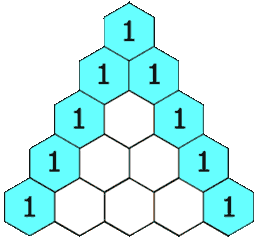Blaise Pascal
Blaise Pascal (19 June 1623 – 19 August 1662) was a French mathematician, physicist, inventor, writer, and Catholic theologian. He was a child prodigy who was educated by his father, a tax collector in Rouen. Pascal's earliest work was in the natural and applied sciences where he made important contributions to the study of fluids, and clarified the concepts of pressure and vacuum by generalizing the work of Evangelista Torricelli. Pascal also wrote in defense of the scientific method.
In mathematics, Pascal was an early pioneer in the fields of game theory and probability theory, collaborating with Pierre de Fermat during the 1650s. His work in this area laid the groundwork for the modern theory of probabilities. He also invented one of the first mechanical calculators, the Pascaline, and his development of Pascal's triangle provided a useful tool for the calculation of binomial coefficients.
Pascal's most influential theological work, Les Pensées (Thoughts), was a defense of Christianity. The book was unfinished at his death and published posthumously. Pascal's wager, an argument in apologetic philosophy which posits that humans bet with their lives that God either exists or does not, is also named after him.
Early Life and Education[edit | edit source]
Blaise Pascal was born in Clermont-Ferrand, France, in 1623. His mother died when he was three years old, and his father, Étienne Pascal, who had an interest in science and mathematics, decided to homeschool Blaise and his sisters. By the age of 12, Pascal had already started to show a remarkable aptitude for mathematics and science.
Contributions to Mathematics[edit | edit source]
Pascal's contributions to mathematics are vast. At the age of 16, he wrote a significant treatise on the geometry of conic sections, inspired by the work of Desargues. This work, however, was not published until 1640. His interest in probability theory was sparked by a problem posed by a gambler, Chevalier de Méré, to Pierre de Fermat. Their correspondence on the problem laid the foundation for the theory of probability.
Contributions to Physics[edit | edit source]
Pascal's experiments on the pressure of fluids led him to formulate Pascal's law, which states that pressure applied to a fluid in a closed container is transmitted undiminished in every direction. He also contributed to the understanding of vacuum and atmospheric pressure, challenging the prevailing Aristotelian notion of a vacuum's impossibility.
Inventions[edit | edit source]
Among Pascal's inventions is the Pascaline, a mechanical calculator capable of performing addition and subtraction, designed to help his father with his work. Although it was a commercial failure, the Pascaline is considered an important step in the development of the computer.
Philosophical and Theological Works[edit | edit source]
In his later years, Pascal focused more on philosophical and theological questions. Les Pensées remains his most famous work in this area, offering insights into his thoughts on human nature, ethics, and faith. Pascal's wager is perhaps the most well-known argument from this work, illustrating his pragmatic approach to the question of God's existence.
Death and Legacy[edit | edit source]
Pascal died at the age of 39 in Paris. Despite his relatively short life, his contributions to mathematics, physics, technology, and philosophy have left a lasting legacy. The unit of pressure, the pascal (Pa), is named in his honor, as is Pascal's law in hydrodynamics.
This article is a mathematics-related stub. You can help WikiMD by expanding it!
Search WikiMD
Ad.Tired of being Overweight? Try W8MD's physician weight loss program.
Semaglutide (Ozempic / Wegovy and Tirzepatide (Mounjaro / Zepbound) available.
Advertise on WikiMD
|
WikiMD's Wellness Encyclopedia |
| Let Food Be Thy Medicine Medicine Thy Food - Hippocrates |
Translate this page: - East Asian
中文,
日本,
한국어,
South Asian
हिन्दी,
தமிழ்,
తెలుగు,
Urdu,
ಕನ್ನಡ,
Southeast Asian
Indonesian,
Vietnamese,
Thai,
မြန်မာဘာသာ,
বাংলা
European
español,
Deutsch,
français,
Greek,
português do Brasil,
polski,
română,
русский,
Nederlands,
norsk,
svenska,
suomi,
Italian
Middle Eastern & African
عربى,
Turkish,
Persian,
Hebrew,
Afrikaans,
isiZulu,
Kiswahili,
Other
Bulgarian,
Hungarian,
Czech,
Swedish,
മലയാളം,
मराठी,
ਪੰਜਾਬੀ,
ગુજરાતી,
Portuguese,
Ukrainian
Medical Disclaimer: WikiMD is not a substitute for professional medical advice. The information on WikiMD is provided as an information resource only, may be incorrect, outdated or misleading, and is not to be used or relied on for any diagnostic or treatment purposes. Please consult your health care provider before making any healthcare decisions or for guidance about a specific medical condition. WikiMD expressly disclaims responsibility, and shall have no liability, for any damages, loss, injury, or liability whatsoever suffered as a result of your reliance on the information contained in this site. By visiting this site you agree to the foregoing terms and conditions, which may from time to time be changed or supplemented by WikiMD. If you do not agree to the foregoing terms and conditions, you should not enter or use this site. See full disclaimer.
Credits:Most images are courtesy of Wikimedia commons, and templates, categories Wikipedia, licensed under CC BY SA or similar.
Contributors: Prab R. Tumpati, MD





